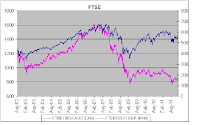Liabilities: $356,000 (+0.5%)
Net Worth: $214,000 (+2%)
For the first time, the net worth increase this month was driven by positive share market returns. The return was offset by significant personal expenditure from Christmas coming through in January.
Assets and liabilities for the month were driven by
- A significant return on one stock investment. The stock was bought significantly below book value and has been the subject of takeover rumours throughout January. I have not sold any of this stock yet as it is still below what I think fair value for the stock is. I will devote a longer post to this later but I am constantly amazed at how a single outstanding return can improve the return of a portfolio with lots of small losses in it
- Much lower levels of cash - much of it spent over Christmas and significant expenditures due in January. I expect this to continue into February as several large bills fall due though to decrease once again in March
- My credit card balance doubled over the month however the shape of my expenditure means that payment of the bills will not all hit in February - some of the expenditure will be spread to March as well
My predictions for the next month include:
- In the next month I will update my superannuation (retirement account) balances which should increase my assets significantly. I have been trying to find a way to do this on a monthly basis however statements are not updated on that regular a basis.
- I also expect my disposable income to decrease by 10% next month as my employee share incentive plan kicks in. This, however should not impact by net worth to as I will reduce my investment expenditure to account for this.
